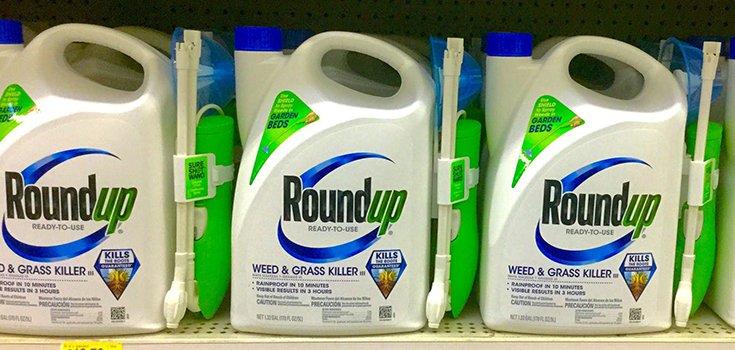The Next Monsanto Glyphosate Cancer Trial is Set to Begin in March

In November, a California judge granted an expedited trial in the case of an elderly California couple who sued Bayer AG’s Monsanto unit alleging the company’s glyphosate-containing herbicide, Roundup, caused their cancer. [1]
The order comes just months after a San Francisco jury awarded a former school groundskeeper a $289 million verdict in the first-ever glyphosate trial. The jury agreed that the man’s repeated exposures to high levels of glyphosate caused his non-Hodgkin’s lymphoma.
That amount was later reduced to $78 million. Bayer is appealing the award. [2]
Bayer AG’s share price has dropped nearly 30% since the August 10th verdict, and the company is facing some 9,300 glyphosate lawsuits. [1]
The trial of Alva and Alberta Pilliod is slated to begin on March 18, 2019, a court filing shows. The couple, who are in their 70’s, allege they developed non-Hodgkin’s lymphoma as a result of using Roundup on a regular basis from 1975 to 2011.
Alva and Alberta Pilliod filed their lawsuit in June 2017 after being diagnosed with the disease in 2011 and 2015, respectively. With the couple facing a possible relapse and their days numbered, the couple’s lawyers asked for an expedited trial earlier this year.
Alberta’s lawyer testified that the woman has 2 brain tumors and suffers from vertigo and nausea. A recent fall caused by a seizure that affected her balance has forced her to drive with one eye closed because of double vision. [2]
In a statement, Bayer AG said:
“While we have great sympathy for the plaintiffs, we are confident that our glyphosate-based herbicides were not the cause of their injuries and we will vigorously defend them at trial.”
On December 7, Bayer posted more than 300 glyphosate safety study summaries online purportedly showing that the weed-killing chemical is safe. The batch of research includes summaries for studies on residues and metabolism, environmental fate, toxicology, and ecotoxicology, as well as information on representative formulations. The postings coincide with the company’s 1-year anniversary of its so-called Transparency Initiative. [3]
In 2015, the International Agency for Research on Cancer (IARC) wing of the World Health Organization (WHO) found that glyphosate was “probably carcinogenic to humans.” In 2017, the U.S. Environmental Protection Agency (EPA) concluded the chemical was safe. That same year, it came to light that a former EPA official might have colluded with Monsanto to kill a study showing that glyphosate causes cancer. [4]
Needless to say, the safety surrounding these herbicides and similar chemicals is certainly not conclusive, especially when you start to dig into how the studies were conducted and funded.
Sources:
[1] Reuters
[3] CropLife
[4] EcoWatch
